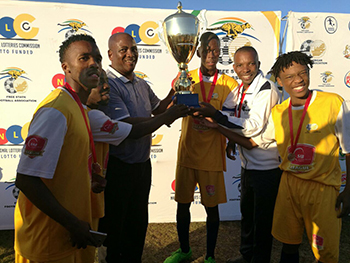Latest News Archive
Please select Category, Year, and then Month to display items
12 January 2024
|
Story Nonsindiswe Qwabe
|
Photo Sonia Small
 Since joining the UFS in 2008, Dr Grey Magaiza has worked extensively on approaches that can foster the socio-economic transformation of societies.
Since joining the UFS in 2008, Dr Grey Magaiza has worked extensively on approaches that can foster the socio-economic transformation of societies.
“The future should be one where communities can decide on their development agenda and futures. That’s the most important for me.” Dr Grey Magaiza, Deputy Director of the Centre for Gender and Africa Studies (CGAS) and Head of the Community Development programme on the Qwaqwa Campus, is passionate about capacitating communities to be agents of change and advancement. His vision for the future emphasises the empowerment of communities to take charge of their development by actively participating in decision making and the implementation of development projects that can improve their lives.
Since joining the UFS in 2008, Dr Magaiza has worked extensively on approaches that can foster the socio-economic transformation of societies. Over the years, he has crafted his research speciality into one that he is most proud of – being an interdisciplinary scientist immersed in the development of communities.
“I’m in a fortunate position of researching what I like. I say ‘fortunate’, because I’ve taken the time to understand what I’m passionate about, which is the overall field of rural livelihoods and livelihood futures – in short, community development. My research starts from an engaged university, understanding the elements that a university must use to enhance transformation and relevance to its immediate community in terms of development.”
One of the ways he has done this is by looking at social entrepreneurship as a development approach for young people in a rural setting. Through workshops with non-profit and civic organisations in Qwaqwa, Dr Magaiza has been helping these organisations to map out their needs and actively meet them through the involvement and support of external role players.
“We understand that communities are part of the national development agenda, but even that national agenda respects community knowledge and intentions and allows communities to shape their identity. A critical enabler of this is community organising. You bring back the capacity in communities to have dialogues on issues affecting them as spaces for engagement, knowledge exchange, and for people to just talk about their way forward.”
By enabling communities to define their development agenda, they can address their specific needs, challenges, and aspirations, he said. “When I look at livelihood futures, it’s quite an exciting aspect of my work – it’s like looking into a fortune tellers’ globe, because you’re not deciding for communities what they should do, but the communities themselves take those decisions.”
UFS football team promoted to ABC Motsepe League
2017-06-01

The Kovsies were the best football team at the SAB
playoffs held in Sasolburg gaining access to the
ABC Motsepe League in 2017/2018.
Photo: Kyle Marais
It means a lot to the football loving community at University of the Free State (UFS) and gives them something to be proud of. This is according to Godfrey Tenoff, coach of the UFS Men’s Football Team, after his team’s recent promotion to the ABC Motsepe League.
The Kovsies were crowned SAB Provincial Champions, an amateur senior league, for a second consecutive year in 2016/2017, but gained access to the ABC Motsepe League by winning the SAB playoffs on 20 and 21 May 2017 in Sasolburg. Thabo (Number) Lesibe and Tenoff was also respectively named Player and Coach of the Tournament at the playoffs. The university has been promoted to the semi-professional ABC Motsepe league for the first time since 2008.
Flirting with success over past few years
Tenoff said UFS football can now be seen as “one that can make a significant contribution to championship culture of sport at the university”.
His troops had flirted with success over the past few years, but couldn’t always translate it into championships. They finished fourth in their SAB provincial league in 2013/2014, second in 2014/2015 and in 2015/2016 won the region, but lost in the SAB provincial playoffs.
Three reasons for outstanding season
Tenoff said there are three reasons for the team’s success and it went on a 22-game unbeaten streak, with 20 games won and two drawn.
They retained most players from the 2015/2016 season and many of them were recruited during that season. Local talent from high schools in Bloemfontein were also recruited and introduced earlier – in July 2016. Lastly, Tenoff said the players and technical team were resilient and objective in their planning.